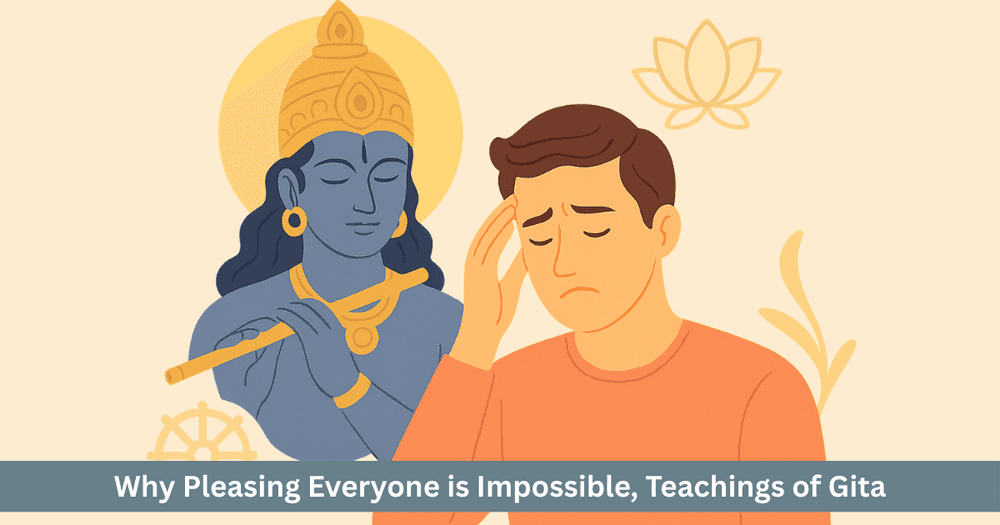The Gita’s Wisdom: Why You Cannot Please Everyone
By Pt. Amitabh Sharma
The Path to Inner Peace and Authenticity

Table of Contents
The Bhagavad Gita reveals profound wisdom: real peace does not come from pleasing others but from living authentically, rooted in awareness of one’s true self. The scripture directly addresses humanity’s deep struggle , seeking validation from others while losing contact with inner truth.
The Illusion of Pleasing Everyone
From childhood, we are taught to avoid conflict, agree politely and suppress discontent. Soon, approval becomes the compass for decision-making. We smile when exhausted, say “yes” against our will and betray our inner voice.
The Gita calls this moha , a fog of delusion and attachment. Krishna makes it clear: living only for others’ opinions is not peace but bondage.
The Gunas and Conditioned Reactions
The Gita analyzes this with the psychological doctrine of the gunas:
- Sattva: harmony, balance, clarity.
- Rajas: desire, restlessness, constant striving.
- Tamas: ignorance, inertia, stagnation.
Most people’s minds are driven by unstable combinations of these qualities. Their approval or criticism reflects their conditioning and turbulence, not ultimate truth. To twist yourself for their approval is to warp your soul inside their distorted lens.
The Cycle of Craving and Validation
Neuroscience validates this: the brain craves social reward. Pleasing others provides a dopamine release. But soon one praise is not enough; the craving intensifies.
The Gita (2.62-63) warns: “Desire leads to attachment, attachment to frustration, frustration to anger, anger to delusion and delusion to total ruin.”
Seeking validation may provide temporary relief but gradually erodes your authentic self, reducing you to an actor on a shifting stage.
Perform Your Duty, Not for Approval
The Gita emphasizes svadharma: your sacred, unique duty rooted in your inner nature. This duty is not up for social voting.
When Arjuna faltered on the battlefield, fearing criticism and disapproval, Krishna did not tell him to seek popularity. He urged him to remember his dharma, act truthfully, even if misunderstood. Truth may look harsh; in reality, it is clarity and courage.
Cultivating Equanimity
Krishna praises (Gita 12.19) the one unmoved by praise or blame. This equanimity is not cold indifference but mature steadiness beyond others’ voices.
Chasing approval traps us in hypervigilance, burnout and anxiety. Living inwardly aligned preserves energy, strengthens clarity and brings calmness to the heart.
Yoga: Not Performance but Presence
Krishna’s definition of yoga is inner union, not external performance. True yoga is action performed from alignment with self, without compulsion to charm or please anyone.
Such authentic presence leads to deep peace.
The Price and Reward of Truth
Krishna offers a difficult yet liberating truth: the path of authenticity is lonely because freedom unsettles conformity. Think of Buddha, Socrates, Gandhi , misunderstood not due to wrongness but because freedom is feared.
Pleasing all may grant popularity but not wholeness. Liberation (moksha) is not in being liked but in being true.
A Call to Sacred Authenticity
The Gita challenges: stand in truth no matter misunderstanding. You are not born to diminish yourself for others’ comfort; you are born to radiate in authenticity.
Sacredness never begs to be liked. Even God incarnate did not please everyone. He lived truth and spoke it boldly.
Frequently Asked Questions (English)
Q1: Why does the Gita call people-pleasing slavery?
A: Because it makes you dependent on unstable opinions, diverting you from inner truth and freedom.
Q2: What do the three gunas suggest about people’s opinions?
A: Praise and criticism are filtered through sattva, rajas and tamas, revealing personal conditioning, not universal truth.
Q3: How does validation-seeking harm us?
A: It traps one in endless craving, leading from desire to delusion, slowly eroding authenticity.
Q4: Why is svadharma important?
A: Because it is one’s unique sacred role, unaffected by approval. Performing it leads to inner peace and clarity.
Q5: What is true yoga in Krishna’s teaching?
A: Inner alignment and presence, not performance or people-pleasing.
Get your accurate Kundali
Generate KundaliDid you like it?
Author

Pt. Amitabh Sharma (56 Years)
Experience: 32
Consults About: Marriage, Career, Business, Health
Clients In: CG, MP, UP, Del
Share this article with friends and family